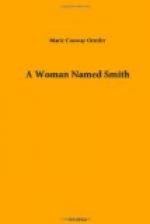I sat still, staring out at the window. There was a thing I hadn’t told The Author, or even Alicia. I had no idea what the “bit of doggerel” meant, if, indeed, it meant anything. But when I had held Freeman Hynds’s old diary in my hands, between the two pages following the last entry had been a creased and soiled piece of paper. I had seen it out of the tail of my eye, as the saying is. It was only a glimpse, but one trained to handle many papers, as I had been, has a quick and an accurate eye. And I knew that the paper found by The Author in the attic, and now lost again, was the paper I had seen in Freeman Hynds’s diary.
CHAPTER IX
THE JUDGMENT OF SPRING
Judge Gatchell’s nephews and nieces, brought by that punctilious gentleman to call upon Miss Alicia Gaines, found her enchanting and cried it to the circumambient air. It was as if the voice of April had summoned the cohorts of Spring. For fresh-faced boys of a sudden appeared in increasing numbers; and flower-faced girls came fluttering into Hynds House like butterflies. They cared for its history and its hatreds not a fig: what has April to do with last November? The faith of Youth has a clearer-eyed wisdom, a sweeter, sounder justice than the sourer verdict of the mature. For theirs is the judgment of Spring. By this sign they conquer.
Susy Gatchell enlisted Mary Meade and Helen Fenwick, and these three held all younger Hyndsville in the hollow of their pink palms. After which, as Doctor Richard Geddes told me wrathfully, you “couldn’t put your foot down without running the risk of stepping on some little cockerel trying to crow around Hynds House.”
The tide was turning in our direction. Also, we were in daily contact with really worth-while people, people that otherwise we should have met only in books, magazines, and newspapers. And they liked us. The amazing miracle was that we, also we, were their sort of folk!
I knew I was being given unbuyable things. One could not live under the same roof with thin dark Luis Morenas and view what magic his pencil worked, without learning somewhat of the holiness of creative work. One couldn’t listen to The Author without being somewhat brightened by his daring wit, his glowing genius; nor live face to face with big Westmacote without revering the broadness of the American master spirit, to which Big Business is only a part of the Great Game. As for Miss Emmeline Phelps-Parsons, it didn’t take Alicia and me long to discover what real depths underlay that Boston-spinster mind of hers.
And you simply couldn’t breathe the same air with The Suffragist—who appeared with two trunks, three valises, and a type-writer, all covered with “Votes for Women!” stickers—without an expansion of the chest. She gave you the impression of having been dressed by machinery out of gear, and of then having been whacked flat with a shovel. When she clapped on what she called a hat, you wondered whether a heron hadn’t built its nest on her head. But when she began to speak, you listened with the ears of your immortal soul stretched wide. Women worshiped her, though Mr. Jelnik’s eyes danced, and Westmacote’s military mustache bristled a bit, and she all but drove Doctor Richard Geddes, who had notions of his own, out of his senses.




